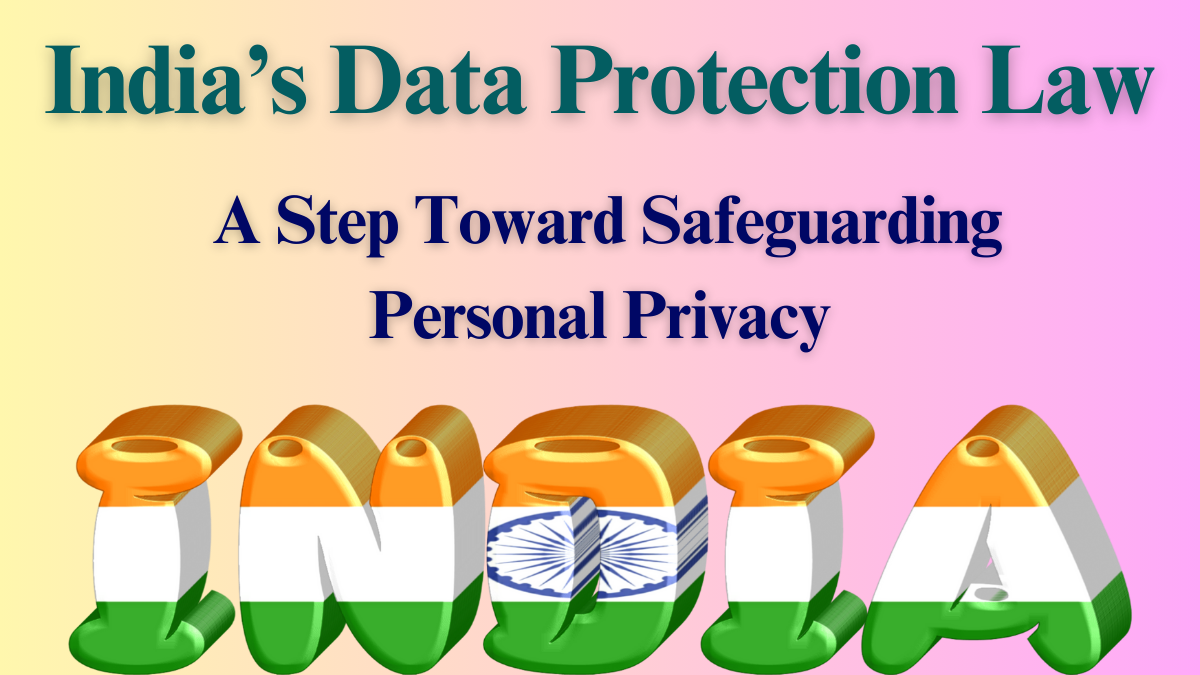India’s long-awaited Data Protection Law has emerged as a significant step towards safeguarding personal data and promoting privacy rights. Designed to be simple, consent-driven, and business-friendly, this law aims to protect citizens’ privacy while allowing businesses to operate efficiently in the digital economy. However, the main challenge lies not in the law itself but in its effective implementation.

Key Features of India’s Data Protection Law
-
Consent-Based Framework The law emphasizes obtaining explicit consent from individuals for the collection, storage, and usage of their personal data. Businesses must ensure that users are fully informed and provide consent voluntarily, making transparency a key aspect of data processing.
-
Personal Data Protection Rights Indian citizens are granted comprehensive rights over their personal data under the new law. These rights include:
- Right to Access: Individuals can request information regarding the personal data collected about them.
- Right to Correction: Citizens can rectify inaccurate data held by organizations.
- Right to Deletion: Individuals have the right to request the deletion of their data under certain conditions.
- Right to Data Portability: Users can move their data from one service provider to another seamlessly.
-
Data Localization A notable feature of India’s Data Protection Law is its push for data localization. Companies that process personal data of Indian citizens must store such data within the country’s borders. This provision ensures better control over sensitive data and aligns with the global trend toward data sovereignty.
-
Regulatory Oversight A dedicated Data Protection Board will oversee the implementation and compliance of the law. The board is responsible for addressing grievances and ensuring that data controllers and processors follow the guidelines. The board will also play an important role in investigating violations and imposing penalties.
Business-Friendly Approach
While the law focuses on protecting personal data, it also aims to create a balanced regulatory environment that allows businesses to grow. The framework is designed with a few business-friendly provisions:
-
Ease of Compliance The law aims to simplify compliance procedures, offering businesses clear guidelines on how to protect data and respect individuals’ rights. This helps reduce the compliance burden on small and medium enterprises (SMEs) while ensuring that larger organizations are not overburdened with excessive regulatory requirements.
-
Self-Regulation for Companies Rather than imposing overly strict guidelines, the law encourages companies to adopt self-regulation practices and data protection measures that fit their business models. This approach ensures that organizations can continue innovating without facing constant regulatory hurdles.
-
Impact on Startups The law is particularly business-friendly for startups, as it offers flexibility in handling customer data. The focus is on creating a secure environment for consumer data while not hindering the growth and agility of new businesses.
-
Global Alignment India’s Data Protection Law is aligned with global standards like the General Data Protection Regulation (GDPR) in Europe. This helps Indian businesses remain competitive in the global market while protecting citizens’ data privacy rights.
Challenges in Implementation
The biggest hurdle for India’s Data Protection Law will be its effective implementation. The law, although comprehensive, requires strong governance, enforcement, and independent regulatory bodies to make sure all stakeholders comply.
-
Independence of the Data Protection Board The Data Protection Board must demonstrate true independence and hold both government agencies and private corporations accountable for any violations of data protection rights. Without an impartial and robust regulatory mechanism, the effectiveness of the law may be compromised.
-
Ensuring Accountability Both government agencies and businesses must be held accountable for their actions. The government must lead by example, ensuring that public sector organizations adhere to the same standards as private companies when it comes to data protection.
-
Technology and Resources Adequate resources must be allocated to the Data Protection Board and other regulatory bodies. Ensuring they have the necessary technology, training, and personnel to enforce the law is crucial for its success.
-
Balancing Innovation with Privacy As the digital economy grows, companies will need to balance innovation with privacy. While data-driven innovation is essential for growth, businesses must ensure they respect individual rights and privacy. Finding this balance will be key to the success of India’s data protection framework.
Conclusion
India’s Data Protection Law represents a positive step toward securing personal data and ensuring privacy rights for its citizens. With its simple, consent-driven approach and focus on business flexibility, the law has the potential to foster a safer and more secure digital economy. However, to truly succeed, the law must be implemented effectively, with an independent regulatory body capable of holding both government and businesses accountable. The coming years will be crucial in ensuring that this law benefits both the people and the economy.
FAQ
1. What is India’s Data Protection Law?
India’s Data Protection Law is designed to safeguard citizens’ personal data, ensuring that businesses obtain consent before collecting or processing data and granting individuals rights to access, correct, and delete their data.
2. How does the law affect businesses?
It requires businesses to handle personal data responsibly, offering clear compliance guidelines while promoting innovation. Businesses must ensure data is collected with explicit consent and protected properly.
3. What role does the Data Protection Board play?
The Data Protection Board oversees the law’s implementation, ensuring compliance, investigating violations, and holding both businesses and government bodies accountable.
4. Does the law align with global standards?
Yes, it aligns with global data protection frameworks like the GDPR, helping Indian businesses compete internationally while maintaining privacy.
5. Can I control how my data is used?
Yes, individuals have the right to access, correct, delete, and transfer their data, ensuring greater control over their personal information.
Click here to learn more.
Pari is a passionate writer known for captivating stories that blend imagination and reality. Inspired by travel, history, and everyday moments, Pari crafts narratives that resonate deeply with readers.
